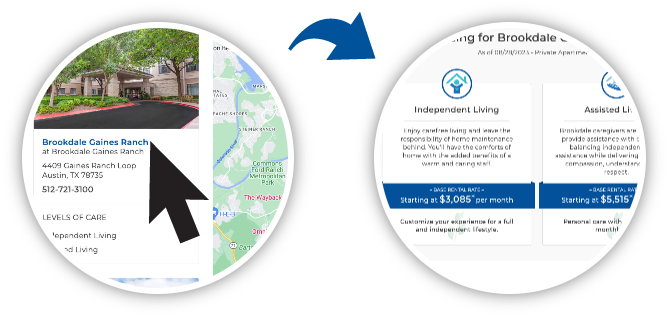- Home
- Healthcare Professional Referrals
- Blogs
- Primary Care Provider Opens Up About His Patients’ Experience in Senior Living
Senior Care
June 5, 2023
Primary Care Provider Opens Up About His Patients’ Experience in Senior Living
Dr. Goodwin is a board-certified internist who has been practicing since 2006. He has worked in the senior care space since 2012, focusing on post-acute care and skilled nursing rehabilitation, where he served as the Physician and Regional Medical Director at Questcare Matrix PLLC in Dallas, Texas. In 2021, Dr. Goodwin cofounded Meridian Health Partners, a Dallas-based medical group that focuses on senior care.
Dr. Goodwin shares how Brookdale’s staff, care coordination and intentionality with our residents all give him peace of mind as a provider while we help keep his patients happy and engaged.
1. What are the benefits for seniors when they move to assisted living communities versus staying in their traditional home?
A lot of folks that I see are living at home and really giving it their best, but for either medical or mobility reasons, they shouldn’t be at home. Moving them into a community can be safer and gives their family peace of mind. When they move in, they gain access to staff who know and understand the aging process and are familiar with different problems that can pop up as you age. Moving into a community makes the aging process less stressful
And in terms of socialization, a lot of folks living at home are lonely. They’re by themselves most of the day. There’s a lot of opportunities for social engagement in senior living communities. I think that’s perhaps one of the largest benefits of moving in.
2. Are there benefits for you as a provider to having seniors move to an assisted living community or memory care environment versus a traditional home?
For providers, the two main benefits of having patients who may be struggling at home move into a senior living community would be information and compliance. The staff makes our job so much easier — they give us much better information than we often get from the patients themselves. They also make implementing care plan changes much easier. If I want to change medications or order a diagnostic workup, having the community staff members available to help is invaluable.
They are also a very important part of maintaining good communication between providers, patients and families. It’s certainly great to have more “hands on deck” when you’re keeping families informed of what’s going on with their loved ones. In the population that we take care of, seniors can get very sick quickly without a lot of warning. So, having community staff members [who] know these residents, constantly interacting with them, is invaluable. There aren’t too many healthcare settings where you get that kind of information. It also helps us prevent emergency room visits and hospital admissions.
The community staff members are an important part of the care team, especially in terms of compliance issues. If patients are having trouble taking their medications as ordered, which is a widely known problem in the senior care space, compliance issues are much easier to manage in the senior community where you have staff overseeing medication administration and other treatment measures that a provider may want to implement. The staff in the senior communities we partner with give us a lot of great information that we would not get otherwise. It makes our lives better — and our care better.
3. Physicians are a trusted resource and are often involved in conversations with patients and their families about assisted living and memory care communities. What do you think physicians should know about communities for these conversations to be most productive?
The conversations with patients who are considering a move are very difficult. People don’t like change. And moving out of a house that you may have lived in for 50 years is a huge change. It's right up there with losing a spouse or giving up the car keys. It’s difficult. And there’s a preconceived notion that all senior communities are the same, and that all levels of care are the same, and that’s just not true. And so, I’ve found that while you should validate the concerns that patients may have about losing their independence, it really helps to dig in and explain what the differences in communities are. I think primary care physicians have the advantage of having earned the trust of those patients. And in most cases, if they spend time to validate the concerns of their patient and give them a chance to ask questions, often those are successful conversations.
4. What are some of the primary obstacles or points of resistance you encounter when beginning these discussions?
The primary obstacle is perception. I know patients, and even a lot of healthcare providers see the senior care space as just one, single space without recognizing that you’re talking about long-term nursing, assisted living, memory care and independent living — and those are very different spaces. So, we spend a lot of time trying to educate our families and our patients on what the different levels are, with the ultimate goal of making the patient happier.
5. How do you suggest physicians learn more to have the confidence to make a recommendation to a patient?
I would recommend that they talk to families and patients who they know have ended up in senior living communities. There’s nothing better than word of mouth, just asking, whether it’s a loved one or a patient, “How do you like it?” They’ll usually tell you the truth. You can tell from those answers a lot. You can tell if it’s just, “The food’s not all that great” — that’s different than, “I never see a nurse.” So, I think getting a recommendation or an opinion from somebody who’s actually lived in a community is by far the best way to judge. The best metrics of senior communities are how happy the residents are. So, speaking to residents who live there is important.
6. What should physicians know about how the health and well-being of seniors is supported at Brookdale, based on your experience?
What stands out to me about Brookdale is that there’s a system. There’s a certain level of care that every community is going to achieve. And that’s unique. That’s unusual. Most of the operators that we work with are very different, not only from each other, but different from themselves, year to year. But Brookdale’s a constant in my view. Then there’s the people. I’ve been lucky to work with some really terrific people in the senior care space in lots of different communities, but certainly the folks I’ve met at Brookdale are some of the hardest-working. Finding communities where you get a sense that the people care about what they’re doing is huge.
Brookdale helps with chronic conditions by giving us immediate, reliable and constant information about a patient’s status. We can rely on the Brookdale staff to alert us to those changes in condition. It’s what helps prevent an unnecessary emergency room visit or a hospital stay. We like to have a very close working relationship between our providers and the community staff members, so no one is ever afraid to escalate something to us. In fact, we preach this, we would rather hear about something that’s not all that important than to not hear about something that turned out to be a problem. So, we work very closely with the Brookdale staff on that.
I think the most important aspect has always been the socialization of senior living communities. I love that about half the time I knock on people’s doors, they’re not there. They’re downstairs, in the common area. They’re playing games. They’re busy socializing, so we have to come back and see them. I think that is certainly the most important thing, beyond the oversight that communities offer — it’s that social engagement. It’s keeping people up, keeping them active. And that happens very often at Brookdale. The communities that you really want your loved ones in are the ones that are able to, in a gentle way, encourage people to get out, engage, meet their neighbors and go to the dining room for dinner. And I definitely see a difference in not just the health and medical outcomes, but the general happiness of residents who are getting that compared to those who are not.
Medication management is obviously a huge part of not just senior care, but adult primary care. Everyone understands that less medicine, generally speaking, is better. And so, with every visit, I ask our providers to look at the medication list every time, look at not only what we think patients are taking, but we want to be looking at the medication lists from the communities. Brookdale uses a common electronic health record that we have access to. So, I can get online at any point and see what medications my patients are getting and know their vital signs. I can look at nursing notes. And that’s tremendously helpful.
7. How does Brookdale’s comprehensive approach to overall well-being and clinical care benefit your patient?
Brookdale does a really great job of being the captain of the ship. My job as a primary care provider is to know everything that’s going on with my patients, and it drives me a little nuts when I don’t. And I sense that Brookdale feels the same way. They want the clinical staff in each of their communities to know everything that’s going on with my patient. And as involved as I am, they’re still going to know a little bit more than I do. They’re going to know — when a resident goes out and sees a specialist — they’re going to know if there’s been some change in the care plan enacted by another provider. They’re going to know if a patient went out to an urgent care with a family member and came back with orders for a new treatment. Those are things that I don’t always find out about. And so, Brookdale does a wonderful job of being the arbiter of all of that. And if I ever need to know what’s going on with my patient, in every community, I know who to call. And I’m going to get a comprehensive answer.
Your patients need your recommendation. To learn more about Brookdale Senior Living services, contact a representative today.
Categories
- Alzheimer's & Dementia
- Caregiver's Corner
- COVID-19
- Health, Safety and Wellness
- Financial Well-Being
- Passion & Purpose
- The Journey to Senior Living
- Trending Now
- Socialization & Relationships
- Brookdale Solutions
- Brookdale Vision and Growth
Archives
View All
- November 2025
- October 2025
- September 2025
- August 2025
- July 2025
- June 2025
- May 2025
- April 2025
- March 2025
- February 2025
- January 2025
- December 2024
X
Let us help find the right community for you!
Complete the form and a Senior Living Advisor will be in touch!


